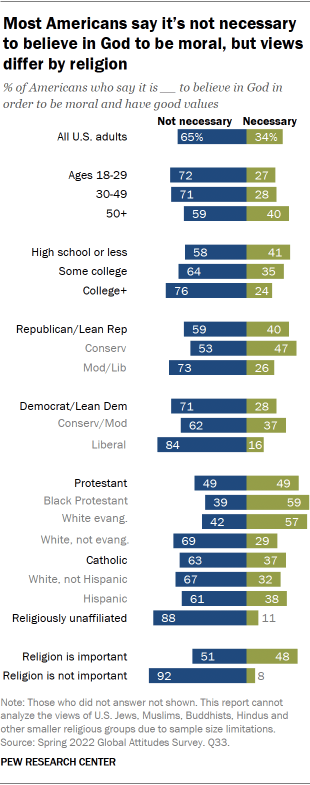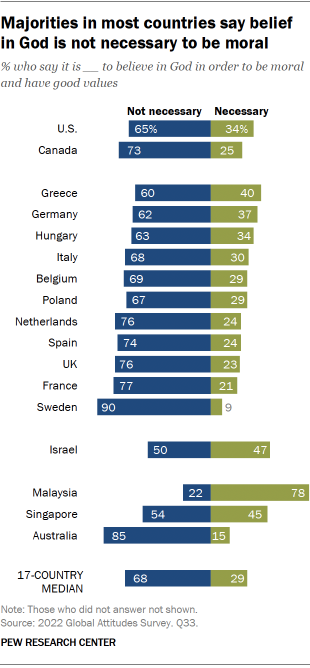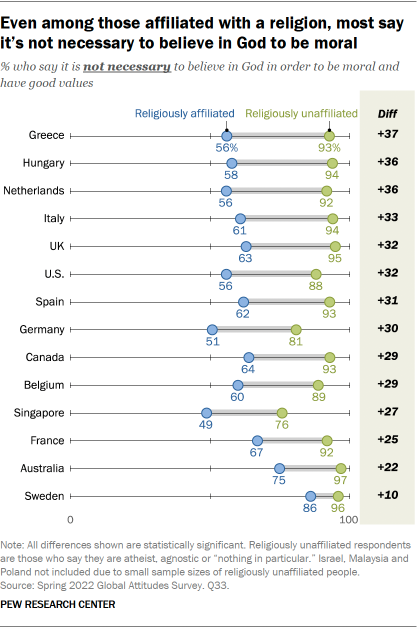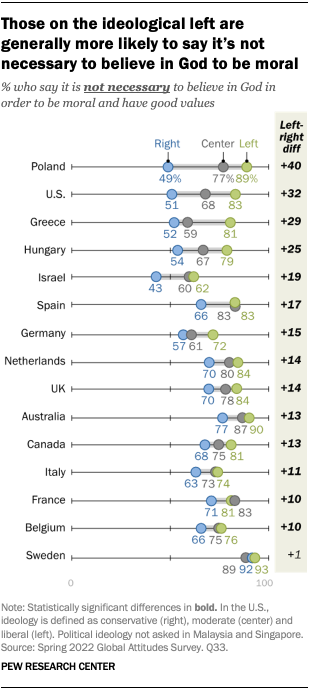Most Americans say it’s not necessary to believe in God in order to be moral and have good values, according to a spring 2022 Pew Research Center survey. About two-thirds of Americans say this, while about a third say belief in God is an essential component of morality (65% vs. 34%).
This analysis focuses on views of religion and morality in 17 advanced economies in North America, Europe, the Middle East and the Asia-Pacific region.
For non-U.S. data, this report draws on nationally representative surveys of 18,782 adults from Feb. 14 to June 3, 2022. All surveys were conducted over the phone with adults in Canada, Belgium, France, Germany, Greece, Italy, the Netherlands, Spain, Sweden, the United Kingdom, Malaysia and Singapore. Surveys were conducted face-to-face in Hungary, Poland and Israel. In Australia, we used a probability-based online panel.
In the United States, we surveyed 3,581 U.S. adults from March 21 to 27, 2022. Everyone who took part in this survey is a member of Pew Research Center’s American Trends Panel (ATP), an online survey panel that is recruited through national, random sampling of residential addresses. This way nearly all U.S. adults have a chance of selection. The survey is weighted to be representative of the U.S. adult population by gender, race, ethnicity, partisan affiliation, education and other categories. Read more about the ATP’s methodology.
Data for Japan and South Korea are not included in this analysis due to differences in the way the question was worded. Translations in these countries emphasized following a religion rather than a belief in God. This analysis also did not separately examine the views of U.S. Jews, Muslims, Buddhists, Hindus and other smaller religious groups due to sample size limitations.
Here are the questions used for the report, along with responses, and the survey methodology.

However, responses to this question differ dramatically depending on whether Americans see religion as important in their lives. Roughly nine-in-ten who say religion is not too or not at all important to them believe it is possible to be moral without believing in God, compared with only about half of Americans to whom religion is very or somewhat important (92% vs. 51%). Catholics are also more likely than Protestants to hold this view (63% vs. 49%), though views vary across Protestant groups.
There are also divisions along political lines: Democrats and those who lean Democratic are more likely than Republicans and Republican leaners to say it is not necessary to believe in God to be moral (71% vs. 59%). Liberal Democrats are particularly likely to say this (84%), whereas only about half of conservative Republicans (53%) say the same.
In addition, Americans under 50 are somewhat more likely than older adults to say that believing in God is not necessary to have good values (71% vs. 59%). Those with a college degree or higher are also more likely to believe this than those with a high school education or less (76% vs. 58%).

Views of the link between religion and morality differ along similar lines in 16 other countries surveyed. Across those countries, a median of about two-in-three adults say that people can be moral without believing in God, just slightly higher than the share in the United States.
Views of religion and morality in other countries
In European and North American countries, at least six-in-ten respondents believe that it is not necessary to believe in God in order to be moral. That includes nine-in-ten Swedes, the highest share of any country surveyed.
In contrast, Israelis are nearly evenly split over whether belief in God is necessary to be moral: 47% say such a belief is necessary, while 50% say it is not.
On the other end of the scale, roughly one-in-five Malaysians believe that people can be moral without believing in God. In every other country surveyed, at least half of people hold this view.
As in the U.S., differences exist in other countries by religion and demographic factors. For example, people who identify as atheist, agnostic or “nothing in particular” are much more likely than the religiously affiliated to separate belief in God from morality.

Still, even among people who are religiously affiliated, most do not think it is necessary to believe in God to have good values. In most countries surveyed, half or more of people who say they belong to a religion also say it is not necessary to believe in God to be moral, including 86% of religiously affiliated Swedes and 75% of religiously affiliated Australians.
Large differences also sometimes appear within countries and religions, as is the case in Israel. Nearly eight-in-ten Israeli Muslims say morality is tied to a belief in God, while a majority of Israeli Jews say it is not. However, views vary widely among Israeli Jews: Nearly nine-in-ten who are Haredi (“ultra-Orthodox”) and Dati (“religious”) – both generally considered Orthodox – say you need to believe in God to have good values (86%). But half of Jews who are Masorti (“traditional”) and only 7% of Hiloni (“secular,” the largest group) agree.

Differences in responses by political affiliation, age and education level also align with results in the U.S. In nearly every country where political ideology is measured, people who place themselves on the political left are more likely than those on the political right to say that belief in God is not necessary to have good values. Sweden is the only country where roughly the same shares on the left and right agree that you can have good values without believing in God.
In addition, younger adults in about half of the countries surveyed are significantly more likely than older respondents to say that a belief in God is not connected with morality. In Greece, for example, more than four-in-five adults under 30 separate a belief in God from morality, compared with about half of adults ages 50 and older (84% vs. 51%). Significant age differences also exist in Poland, Italy, Singapore, Hungary, the Netherlands, Canada and the United Kingdom.
People with at least a college degree are also more likely to say a belief in God is not necessary to have good values. The differences by education are largest in Spain and Germany.
Overall, the answers to this question have been relatively consistent over time across the countries surveyed.
The economic context of religion and morality
The countries polled in our most recent global survey are all advanced economies, but previous Pew Research Center surveys have investigated the link between belief in God and morality in emerging and developing economies. At the start of the coronavirus pandemic in 2020, Pew Research Center suspended fieldwork in countries where surveys are conducted in person, many of which are emerging or developing economies. It is slowly returning to these countries as conditions improve, but not in time for this survey to include those countries.
A 2019 survey of 34 countries, including 10 emerging and developing economies, found that countries with lower gross domestic products (GDPs) had higher shares of people who say a belief in God is essential for morality (r = -0.86). For example, in Kenya, which had the lowest GDP per capita, 95% of people saw believing in God as a necessary aspect of morality. By contrast, in Sweden, which had one of the highest GDPs per capita of the countries surveyed in 2019, only 9% of people expressed this view. More than eight-in-ten also held this view in Brazil, South Africa, Tunisia, Nigeria, Indonesia and the Philippines – all countries with emerging or developing economies as of 2019.
Like the 2022 survey, the 2019 survey found that older people and those with less education are more likely to see a connection between belief in God and living a moral life.
Note: Here are the questions used for the report, along with responses, and the survey methodology and full dataset.

